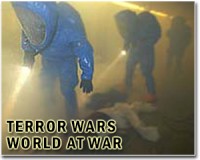 |
Sanaa, Yemen (UPI) Nov 3, 2010 The Saudi intelligence service's tip-off to the British about the al-Qaida parcel bombs found on cargo jets last week is the result of a long, clandestine penetration of the jihadist network in Yemen. Many of the kingdom's most-wanted terrorists are holed up in Yemen after fleeing their homeland and they're the ones who are running the network's war these days. Yemeni officials say the tip-off came from Jaber al-Fayfi, a Saudi activist with the Yemen-based al-Qaida in the Arabian Peninsula who was turned by Saudi intelligence. One of AQAP's key objectives is overthrowing the Saudi monarchy. On Aug. 27, 2009, a 23-year-old AQAP suicide bomber, pretending to be a surrendering defector, tried to assassinate Prince Mohammed bin Nayef, commander of the kingdom's counter-terrorism forces. The would-be assassin carried the explosives either in his anal cavity or in his underwear. The device was detonated by a cellphone in the prince's palace in the Red Sea port of Jeddah, killing the bomber but only slightly wounding the royal. Prince Mohammed is Saudi Arabia's deputy interior minister. He was responsible for crushing al-Qaida which terrorized the kingdom in 2003-06. Those who escaped death or capture fled to neighboring Yemen. The jihadist who tried to kill him was Abdullah al-Asiri, a Saudi jihadist on Riyadh's most wanted list of 85 al-Qaida fugitives, at least 26 of whom are in Yemen. The bomb was made by his brother, Ibrahim. He also is believed to have made the device, allegedly hidden in a suspect's underwear, used to try to blow up a U.S. airliner over Detroit on Christmas Day 2009. Ibrahim Hassan al-Asiri has also been identified as the bombmaker of the PETN-filled Hewlett-Packard toner cartridges found aboard cargo jets in England and the United Arab Emirates last week. The attempt to kill Prince Mohammed, son of hard-line Interior Minister Prince Nayef bin Abdulaziz, was the closest al-Qaida has ever come to killing a member of the House of al-Saud. That attack was seen as a major escalation in al-Qaida's renewed operations against the kingdom, the world's largest oil exporter. Soon after Prince Mohammed's miraculous escape, Ibrahim al-Rubaish, al-Qaida's grand mufti, or religious leader, called for a new campaign of assassination among the kingdom's extended royal family. Rubaish, who hails from the ultra-conservative Saudi region of Buridah, was captured in Afghanistan by U.S. forces and held at Guantanamo Bay. He was released in December 2006 with other Saudis and enrolled in the kingdom's rehabilitation program for former jihadists. In April 2008, he absconded to Yemen with 11 other former Guantanamo inmates, including al-Fayfi, who defected in September. As well as blowing the whistle on the cargo jet plot, he probably tipped off the Saudis about al-Qaida plans for attacks in Europe, particularly France, whose intelligence service was duly warned by Riyadh. In January 2009, Yemen's al-Qaida affiliate and the Saudi fugitives announced the formation of AQAP. Five months later, Saudi Arabia's principal security service, the General Intelligence Presidency, established a station in Sanaa, Yemen's capital. Ostensibly that was to help coordinate a joint campaign against northern Shiite rebels along the kingdom's border. But its main task was to send out agents among Yemen's unruly tribes to infiltrate AQAP and hunt down its activists. The agency, headed since October 2005 by Prince Muqrin bin Abdulaziz, younger half-brother of King Abdullah, was followed several weeks later by a unit from the General Security Service, which is attached to the Saudi Interior Ministry. The Saudis, longtime adversaries of the republicans who triumphed over the royalists in Yemen's civil war of the 1960s, have long distrusted their southern neighbors. Their biggest concern is that Yemeni President Ali Abdukllah Saleh's intelligence services have been deeply infiltrated by the jihadists. Indeed, the Saudis fear that the network of agents and informers they have built up, aided no doubt by large amounts of Saudi gold, could be compromised. Intelligence Online, a Paris Web site that specializes in global security affairs, reported this week that the Saudi Interior Ministry is lobbying Saleh "to replace Gen. Ghaleb al-Qimch, head of the Political Security Organization, whom it suspects of having links with jihadist groups."
Share This Article With Planet Earth
Related Links The Long War - Doctrine and Application
 Egypt Muslim leaders denounce Qaeda threat to Copts
Egypt Muslim leaders denounce Qaeda threat to CoptsCairo (AFP) Nov 3, 2010 An Al-Qaeda threat to Egypt's Coptic Christians has met with growing condemnation from leading Muslim figures and the press in Egypt, which said it was an attack on national unity. The Muslim Brotherhood opposition group said Muslims must protect Christian houses of worship after an Al-Qaeda group in Iraq threatened to target Copts and other Christians. "The Muslim Brotherhood is stressi ... read more |
|
| The content herein, unless otherwise known to be public domain, are Copyright 1995-2010 - SpaceDaily. AFP and UPI Wire Stories are copyright Agence France-Presse and United Press International. ESA Portal Reports are copyright European Space Agency. All NASA sourced material is public domain. Additional copyrights may apply in whole or part to other bona fide parties. Advertising does not imply endorsement,agreement or approval of any opinions, statements or information provided by SpaceDaily on any Web page published or hosted by SpaceDaily. Privacy Statement |